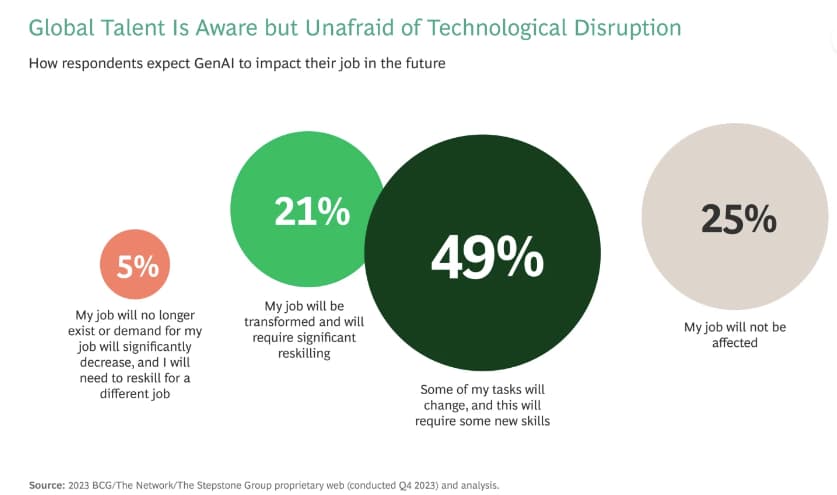The influence of expertise within the office is consistently altering. Take into consideration this: Nearly all employed Individuals have e-mail accounts, many supplied by their employers to construct connections and assist them carry out their jobs. It’s develop into an employment expectation. In line with the Pew Analysis Heart, greater than three-quarters of individuals with work e-mail say the instrument makes it simpler to maintain up with work.
Nevertheless, as e-mail grew to become prevalent within the ’90s, employers, HR leaders and workers had been possible uncertain how the brand new expertise would change the office. It’s an instance of how tech goes from cutting-edge to commonplace.
At this time, employer focus is on synthetic intelligence and the way this newest wave of HR tech will affect office priorities. What do workers count on to achieve from their employers concerning entry to gen AI and different ultra-modern tech options?
The June 2024 Decoding International Expertise survey, carried out by BCG/The Community/The Stepstone Group, shed some gentle on this query. This annual research supplies insights into employee priorities and perceptions from greater than 150,000 individuals throughout 188 nations. The report demonstrates that the issues that matter most to workers are shifting, and employers who meet workforce expectations will likely be higher positioned to draw and retain expertise within the international labor market.
Gen AI and job safety
For the primary time within the 10-year lifespan of the Decoding International Expertise survey, job safety emerged as the highest office precedence amongst respondents. BCG researchers counsel that this elevated give attention to job safety could also be as a consequence of business restructuring and heightened geopolitical uncertainty, a few of it round AI. Whereas the influence of expertise on jobs is just not new, the disruptive potential of gen AI is affecting a variety of sectors, influencing not solely repetitive duties but additionally the potential for artistic and conceptual work.
Curiously, gen AI adoption varies by location. In line with the BCG survey, practically 40% of respondents use gen AI instruments recurrently, with greater adoption charges in rising economies. This pattern persists even when controlling for age, career or business. Excessive-income economies like Switzerland, Australia, Estonia and Singapore additionally present vital gen AI adoption charges. On the identical time, European and Center Japanese nations lag, maybe as a consequence of stricter rules and perceived dangers.
Matej Hrapko, a long-time Decoding International Expertise interviewee from Austria, likens the gen AI motion to previous technological shifts, such because the transition from landlines to cellphones—he says there’s a want for fixed adaptation.
Whereas greater than 70% of respondents anticipate that their jobs will change, requiring them to develop new abilities within the face of gen AI, the excellent news is {that a} very small phase (5%) expects to lose their jobs or face a big lack of demand for his or her employment.
The survey reveals that staff are more and more looking for jobs providing each job safety and studying and improvement alternatives—two components which might be changing into extra parallel to one another. In line with the research, most staff acknowledge the need of understanding which abilities to construct to remain aggressive, they usually understand not doing this might price them work alternatives.
Is HR accountable for tech-centered studying investments?
HR leaders should construct their organizations’ capability to develop new abilities at a a lot bigger scale and a a lot quicker tempo than is presently potential at this time, says Orsolya Kovács-Ondrejkovic, affiliate director of individuals technique at BCG. “This requires vital funding in studying—greater than what most firms presently dedicate,” she says.

To carry this useful resource to scale, HR leaders ought to place tech-centered studying applications as belongings that repay moderately than bills. Nevertheless, speaking this to the C-suite and different executives stays difficult for a lot of CHROs.
Nevertheless, so long as these budgets are thought-about prices moderately than investments, in response to Kovács-Ondrejkovic, they’re prone to obtain decrease precedence than different monetary commitments. This attitude might restrict the strategic worth and long-term advantages firms may achieve from enhancing worker capabilities.
Plus, one other roadblock demonstrates the worth of instructional applications: “Most employers nonetheless have a protracted method to go by way of gathering information and calculating the return on funding on the subject of studying,” in response to Kovács-Ondrejkovic.
Employers additionally face a fancy problem in attracting and retaining expertise, which turns into extra difficult when contemplating fulfill the workforce’s thirst for brand new abilities, coaching and improvement alternatives. Kovács-Ondrejkovic emphasizes that this may require a paradigm shift in how employers method company studying.
HR leaders should anticipate technological impacts on their workforce and provide reskilling applications to assist workers keep aggressive. The survey reveals a willingness to reskill amongst 57% of respondents, notably these with decrease or mid-level schooling; in the meantime, older people are usually much less open to reskilling.
Hrapko, the long-time survey participant, personifies this angle: “I’m nonetheless pretty younger and capable of study this new expertise now,” he says. “For the subsequent [tech shift] that can come, I might in all probability have extra bother.”

Stepstone Group
Are employers missing in growing workforce abilities?
A separate survey carried out by the ADP Analysis Institute, titled Individuals at Work, enhances the findings that workers worth job safety and need employer-provided progress alternatives. The ADP report gives an in depth look into staff’ sentiments concerning profession development, talent improvement and the influence of synthetic intelligence on job safety. The ADP survey gathered responses from 34,612 staff from 18 nations throughout numerous areas in Latin America, North America and Asia Pacific.
A major discovering from the ADP survey is the perceived lack of employer funding in talent improvement. Lower than half of the employees surveyed really feel their employers contribute to the talent progress they should advance their careers. Practically half imagine that future talent units would require technological data that isn’t presently crucial of their jobs.
The ADP survey additionally delves into staff’ views on AI and job safety, revealing that 43% assume having AI on the job will likely be useful. Those that imagine AI will make their work simpler by saving time each day are much less prone to really feel insecure about their jobs in comparison with those that are uncertain about how new AI instruments will affect their workday.
In line with ADP, confidence in profession development seems linked to perceptions of AI, with 60% of staff believing they’ve the abilities to advance to the subsequent job stage inside three years. That is notably related when workers imagine they’ll develop new competencies by way of their office. Amongst these anticipating common AI help from their employer, 70% are assured of their abilities for profession development.
Each surveys spotlight the altering priorities of staff and the truth that studying is now anticipated as a part of employment advantages. “Our information clearly present that job seekers search for employers that assist them construct and keep future-proofed abilities,” says Kovács-Ondrejkovic. “Having sturdy studying and improvement choices is now not good to have, however a significant deal breaker.”
